Vermont Yankee support picking up steam
The View from Vermont
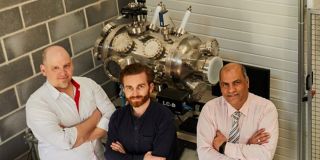
A message from Chapman Nuclear
New Lattice Confinement Fusion Power Reactors May Eliminate 95% of SNF
The View from Vermont

The ANS 2011 Student Conference, Living in the Heartland of the Nuclear Renaissance, will be hosted by the ANS Student Section from Georgia Institute of Technology at the Hyatt Regency in Atlanta, April 14-17, 2011. Registration for the conference is now open.
The 38th Carnival of Nuclear Energy Blogs is up at Canadian Energy Issues. The carnival features blog posts from the leading U.S. nuclear bloggers and is a roundup of featured content from them.
But first EdF and Areva have to get organized at home
 Happy Groundhog Day! This doesn't actually count as a holiday, but at the very least it is the one day each year that every American can devote to the contemplation of quantum physics. Can there be any bigger fun than that?
Happy Groundhog Day! This doesn't actually count as a holiday, but at the very least it is the one day each year that every American can devote to the contemplation of quantum physics. Can there be any bigger fun than that?
For the majority of human history, people used their own muscles to provide almost all of the work required for survival and development. A thin slice of humanity achieved a moderate amount of personal comfort and leisure because they were able, often through an accident of birth, to control a portion of the daily work output of hundreds to thousands of their fellow humans. The only sources of work-in the engineering sense-that were not either human or animal muscle came from capturing falling water or intermittently by capturing the breezes through devices like cloth sails or wind mills.
Eric Loewen, the American Nuclear Society's vice president/president-elect, appeared on the Fox News Charlotte (North Carolina) television show on January 28 to promote new nuclear energy as part of the push in the United States for clean energy technologies.
From high in orbit above planet Earth... to the dusty surface of the moon... to the stunning cloud tops and moons of Jupiter... to the dazzling rings of Saturn... even to the darkness at the edge of interstellar space-nuclear technology has made possible incredible journeys to extraordinary destinations in our Solar System, and opened doors to some of the most profound discoveries of all time. Yet, the future of nuclear technology for space exploration promises even more remarkable journeys and more amazing discoveries.
 The 37th Carnival of Nuclear Energy Bloggers is now up at Idaho Samizdat.
The 37th Carnival of Nuclear Energy Bloggers is now up at Idaho Samizdat.
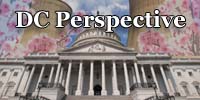 In his State of the Union speech on January 25, President Barack Obama advocated a Clean Energy Standard that includes natural gas as well as renewables, nuclear and "clean coal." In my previous post on Clean Energy Standards, I said that if the standard were expanded to include natural gas generation, then the required clean energy percentage would have to be increased substantially in order for the policy to remain meaningful, particularly if gas is given "full credit" (i.e., is treated no differently than non-emitting generation).
In his State of the Union speech on January 25, President Barack Obama advocated a Clean Energy Standard that includes natural gas as well as renewables, nuclear and "clean coal." In my previous post on Clean Energy Standards, I said that if the standard were expanded to include natural gas generation, then the required clean energy percentage would have to be increased substantially in order for the policy to remain meaningful, particularly if gas is given "full credit" (i.e., is treated no differently than non-emitting generation).
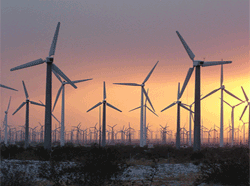 It is often stated that since no one can charge money for the wind, wind-generated electricity is free. This is not true. A modern wind turbine, which can generate 2 megawatts of electricity (MWe) when the wind is blowing, costs about $3.5 million installed. Five hundred of these turbines installed at a wind farm, to be able to generate 1000 MWe, would cost $1.75 billion. Add in other costs, such as for operation and maintenance (O&M) and transmission lines, and the total sum could match the approximate $4 billion required to build a nuclear plant.
It is often stated that since no one can charge money for the wind, wind-generated electricity is free. This is not true. A modern wind turbine, which can generate 2 megawatts of electricity (MWe) when the wind is blowing, costs about $3.5 million installed. Five hundred of these turbines installed at a wind farm, to be able to generate 1000 MWe, would cost $1.75 billion. Add in other costs, such as for operation and maintenance (O&M) and transmission lines, and the total sum could match the approximate $4 billion required to build a nuclear plant.
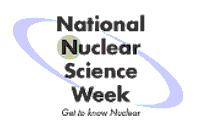 Excelsior College on Wednesday, January 26, is hosting a webinar, Can the U.S. Catch the World in the Nuclear Power Race? which will bring together scholars and nuclear technology practitioners from across the United States for a panel discussion on the subject matter. The event is being held in conjunction with National Nuclear Science Week.
Excelsior College on Wednesday, January 26, is hosting a webinar, Can the U.S. Catch the World in the Nuclear Power Race? which will bring together scholars and nuclear technology practitioners from across the United States for a panel discussion on the subject matter. The event is being held in conjunction with National Nuclear Science Week.
National Nuclear Science Week, January 24-28, is underway across the United States and is being promoted in Minnesota with activities that include tours of PaR Nuclear's facility, a student essay competition, and trivia contests.
View from Vermont
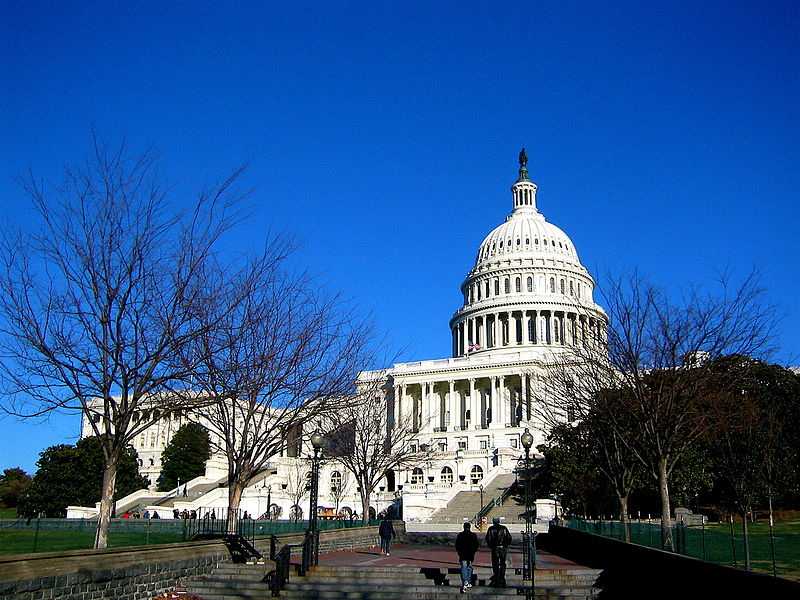 Leading figures from Congress, the commercial nuclear industry, and academia will convene on January 27 on Capitol Hill in Washington, D.C., to detail the contributions of nuclear technology and the possibilities associated with education in nuclear science. Senate Energy and Natural Resources Committee Chairman Jeff Bingaman (D., N.M.) will be the featured speaker at a discussion of the contributions, innovations, and opportunities that can be found by exploring nuclear science.
Leading figures from Congress, the commercial nuclear industry, and academia will convene on January 27 on Capitol Hill in Washington, D.C., to detail the contributions of nuclear technology and the possibilities associated with education in nuclear science. Senate Energy and Natural Resources Committee Chairman Jeff Bingaman (D., N.M.) will be the featured speaker at a discussion of the contributions, innovations, and opportunities that can be found by exploring nuclear science.
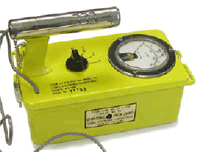 The American Nuclear Society's Public Education Program will be sponsoring a one-day teacher workshop on Sunday, February 27, at the Phoenix Convention Center in Phoenix, Ariz. The workshop-Detecting Radiation in Our Radioactive World-is intended for science educators (including biology, chemistry, earth science, physics, physical science, life science, environmental, and general science) at the high school and middle school levels. WM Symposia, Inc., is cosponsoring the workshop, which will be held prior to WM2011, the international waste management conference that is held in Phoenix.
The American Nuclear Society's Public Education Program will be sponsoring a one-day teacher workshop on Sunday, February 27, at the Phoenix Convention Center in Phoenix, Ariz. The workshop-Detecting Radiation in Our Radioactive World-is intended for science educators (including biology, chemistry, earth science, physics, physical science, life science, environmental, and general science) at the high school and middle school levels. WM Symposia, Inc., is cosponsoring the workshop, which will be held prior to WM2011, the international waste management conference that is held in Phoenix.
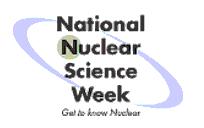 On Saturday, January 22, the Chicago ANS Local Section launched the activities for National Nuclear Science week a day early by presenting a student nuclear science workshop, hosted by the Chicago Museum of Science and Industry (MSI). Chicago MSI-the largest science museum in the western hemisphere-included the workshop as part of the Scientist at Work series, in which high school science achievers learn about different science disciplines and career paths.
On Saturday, January 22, the Chicago ANS Local Section launched the activities for National Nuclear Science week a day early by presenting a student nuclear science workshop, hosted by the Chicago Museum of Science and Industry (MSI). Chicago MSI-the largest science museum in the western hemisphere-included the workshop as part of the Scientist at Work series, in which high school science achievers learn about different science disciplines and career paths.
The voice of the nuclear renaissance is found in a weekly wrap up
Eric Loewen, the American Nuclear Society's vice president/president-elect, appeared on the Good Day Columbia (South Carolina) television show on the morning of January 21 to discuss nuclear energy technologies and nuclear-related activities in South Carolina.
 At a session on educational programs during a recent ANS meeting, a fairly new graduate student in nuclear engineering described a nuclear survey course that he had taken at his university. The graduate student had not studied nuclear engineering as an undergrad, and when he said, "I had never really heard of Chernobyl before I took this course," you could almost hear an audible gasp among the more, well, mature members of the audience.
At a session on educational programs during a recent ANS meeting, a fairly new graduate student in nuclear engineering described a nuclear survey course that he had taken at his university. The graduate student had not studied nuclear engineering as an undergrad, and when he said, "I had never really heard of Chernobyl before I took this course," you could almost hear an audible gasp among the more, well, mature members of the audience.